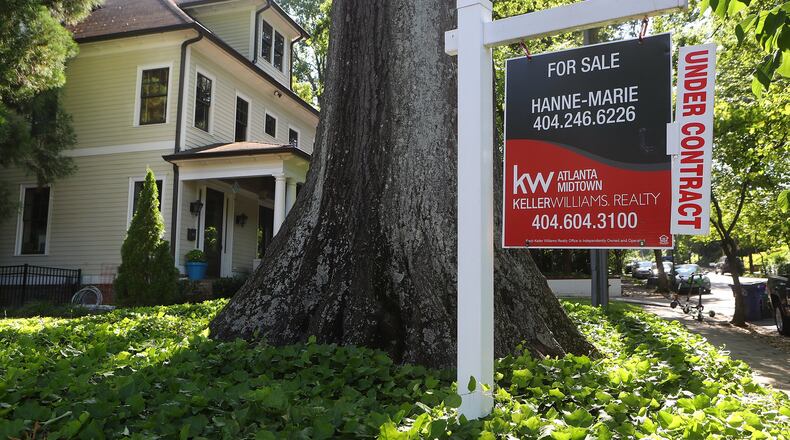The pace of sales in the metro Atlanta housing market slowed last month, despite a spring surge in the number of homes listed for sale, according to the Atlanta Realtors Association.
The dip seemed to signal a decline in buyer interest, since it wasn’t a lack of choices.
The number of homes listed was up 12.7% from May 2018, according to DeAnn Golden, president of the Realtors group.
That increase “has improved the availability of home options for buyers,” but it hasn’t meant more sales, she said.
Nearly 6,000 homes were sold during May in the 11 central counties of the Atlanta region tracked by the group. That was 3.7% fewer sales than the same month a year ago.
For several years, Atlanta has been considered a seller’s market with potential buyers sometimes bidding against each other for a small number of listings and prices rising robustly.
But late last year, the power started tilting slowly back toward buyers – and that shift has continued.
The added supply of homes for sale combined with fewer buyers has meant a deceleration in prices – they were still rising in May, but nowhere near as fast as they were a year ago.
Last month’s median price was up 4.3% over last year. In contrast, the median home price in May 2018 was 9.4% higher than in May 2017.
In May, the supply of homes listed represented 3.1 months of sales, roughly half of what experts say is a balanced market with equal negotiating power for both buyers and sellers.
"The market is beginning to look more balanced for both buyers and sellers," said broker Torrence Ford, owner of Re/Max Premier. "Sellers can still expect to sell in 21 days or less if their home is priced right and buyers are still able to get concessions from sellers."
Metro Atlanta was one of the regions hit hardest by the burst of the housing bubble and the deep recession that followed. The area suffered an estimated quarter-million foreclosures and a plunge in home values.
But after the market hit bottom in 2012, prices in many areas rapidly rose, especially at the lower tier of homes that would typically attract first-time home buyers. Those increases consistently outpaced the growth of incomes in Atlanta and triggered concern that too many people were being priced out. That fear has been supported by months of declines in the number of homes sold.
In May, the median price of a home sold was $293,000. The household median income is $56,183 in Georgia, but is above $60,000 in metro Atlanta, according to the Census Bureau.
With a down payment of $25,000, that median Atlanta household could just about afford that median home, according to Smart Asset, an online credit source.
But the income of many potential first-time buyers is below that level. And in the city of Atlanta and the nearby suburbs – where many young professionals live – it is increasingly difficult to find houses at that price or lower. Because land prices continue to rise, builders are constructing more expensive homes to turn a profit.
That mismatch has undercut price increases, said John Hunt, principal of MarketNsight, a metro Atlanta-based housing research company. "The long-term moderation (of prices) is going to continue because we can't build affordable homes anymore."
During a conference Thursday hosted by his company, Hunt said that the share of sales going to first-time buyers is dramatically lower than it was before the recession. "That was the old world."
Metro Atlanta housing market, May
Total Home Sales -3.7%
Median Sales Price +4.3%
Source: Atlanta Realtors Association, First Multiple Listing Service
Largest metro counties, May’s median home sales price
Cobb: $305,000
DeKalb: $322,000
Fulton: $385,000
Gwinnett: $267,000
Source: Atlanta Realtors Association, First Multiple Listing Service
About the Author
Keep Reading
The Latest
Featured




